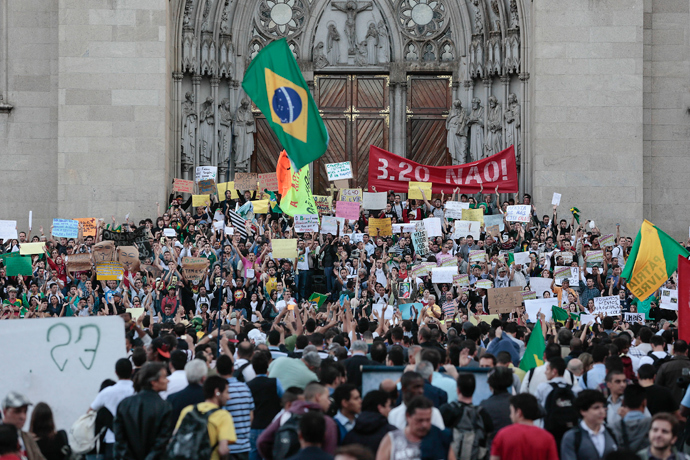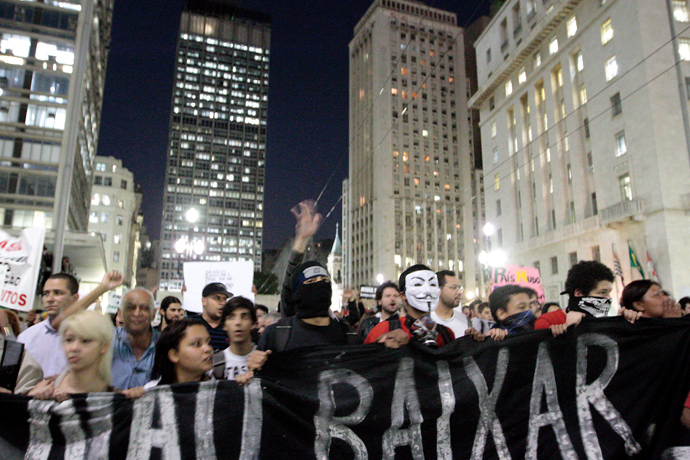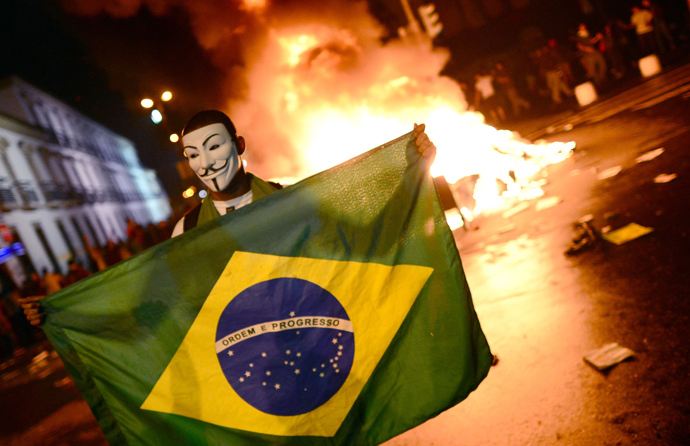Brazil burning: The story of an illusion gone sour

Protests in Brazil indicate what goes way, way beyond a cheap bus fare.
When, in late 2010, Dilma Rousseff was elected President after
eight years of the impossibly popular Lula, a national narrative
was already ingrained, stressing that Brazil was not the
“country of the future” anymore; the future had arrived,
and this was a global power in the making.
This was a country on overdrive – from securing the 2014 World
Cup and the 2016 Olympics to a more imposing role as part of the
BRICS group of emerging powers.
Not unlike China, Brazil was breathlessly exploiting natural
resources – from its hinterland to parts of Africa – while
betting heavily on large agribusiness mostly supplying, you guess
it, China.
But above all Brazil fascinated the world by incarnating this
political UFO; a benign, inclusive giant, on top of it
benefitting from a lavish accumulation of soft power (music,
football, beautiful beaches, beautiful women, endless
partying).
The country was finally enjoying the benefits of a quarter of a
century of participative democracy – and self-satisfied that for
the past ten years Lula’s extensive social inclusion policies had
lifted arguably 40 million Brazilians to middle class status.
Racial discrimination at least had been tackled, with instances
of the Brazilian version of affirmative action.
Yet this breakneck capitalist dream masked serious cracks. Locally there may be euphoria for becoming the sixth or seventh world economy, but still social exclusion was far from gone. Brazil remained one the most (deadly) unequal nations in the world, peppered with retrograde landowning oligarchies and some of the most rapacious, arrogant and ignorant elites on the planet – inevitable by-products of ghastly Portuguese colonialism.

And then, once again, corruption raised its Hydra-like head.
Here’s a first parallel with Turkey. In Brazil as in Turkey,
participative democracy was co-opted, ignored or forcefully
diluted among an orgy of “mega-projects” generating
dubious profits for a select few. In Turkey it revolves around
the ruling party AKP’s collusion with business interests in the
“redevelopment” of Istanbul; in Brazil around public funds
for the hosting of the World Cup and the Olympics.
The new capitalist dream could not mask that the quality of life
in Brazil’s big cities seemed to be on a downward spiral; and
that racism – especially in the police – never went away while
the demonization of peasant and Native Brazilian leaders was
rampant; after all they were obstructing the way of powerful
agribusiness interests and the “mega-projects” craze.
What can a poor boy do
There’s no Turkey Spring – as there’s no Brazilian Spring. This
isn’t Tunisia and Egypt. Both Turkey and Brazil are democracies –
although Prime Minister Erdogan has clearly embarked on a
polarizing strategy and an authoritarian drive. What links Turkey
and Brazil is that irreversible pent-up resentment against
institutional politics (and corruption) may be catalyzed by a
relatively minor event.
In Turkey it was the destruction of Gezi park; in Brazil the
ten-cent hike in public bus fares was the proverbial straw that
broke the (white) elephant’s back. In both cases the
institutional response was tear gas and rubber bullets. In Turkey
the popular backlash spread to a few cities. In Brazil it went
nationwide.
This goes way, way beyond a cheap bus ride - although the public transport scene in Brazil’s big cities would star in Dante’s ninth circle of hell. A manual worker, a student, a maid usually spend up to four hours a day back-and-forth in appalling conditions. And these are private transport rackets controlled by a small group of businessmen embedded with local politicians, who they obviously own.

Arguably the nationwide, mostly peaceful protests have scored a
victory – as nine cities have decided to cancel the bus fare
hike. But that’s just the beginning.
The mantra is true; Brazilians pay developed world taxes and in return get sub-Saharan Africa quality of service (no offense to Africa). The notion of “value for money” is non-existent. It gets even worse as the economic miracle is over. That magical “growth” was less than 1% in 2012, and only 0.6% in the first quarter of 2013. The immensely bloated state bureaucracy, the immensely appalling public infrastructure, virtually no investment in education as teachers barely get paid $300 a month, non-stop political corruption scandals, not to mention as many homicides a year as narco-purgatory Mexico – none of this is going away by magic.
Football passion apart – and this is a nation where everyone is
either an expert footballer or an experienced coach – the vast
majority of the population is very much aware the current
Confederations Cup and the 2014 World Cup are monster FIFA
rackets. As a columnist for the Brazilian arm of ESPN has coined
it, “the Cup is theirs, but we pay the bills.”
Public opinion is very much aware the Feds played hardball to get the “mega-events” to Brazil and then promised rivers of “social” benefits in terms of services and urban development. None of that happened. Thus the collective feeling that “we’ve been robbed” – all over again, as anyone with a digital made in China calculator can compare this multi-billion dollar orgy of public funds for FIFA with pathetically little investment in health, education, transportation and social welfare. A banner in the Sao Paulo protests said it all; “Your son is ill? Take him to the arena.”

Remember “Standing Man”
The neo-liberal gospel preached by the Washington consensus only
values economic “growth” measured in GDP numbers. This is
immensely misleading; it does not take into account everything
from rising expectations for more participative democracy to
abysmal inequality levels, as well as the despair of those trying
to just survive (as in the orgy of expanded credit in Brazil
leaving people to pay annual interest rates of over 200% on their
credit cards).
So it takes a few uprooted trees in Istanbul and a more expensive
shitty bus ride in Sao Paulo to hurl citizens of the “emerging
markets” into the streets. No wonder the Brazilian protests
left politicians - and “analysts” - perplexed and
speechless. After all, once again this was people power – fueled
by social media - against the 1%, not that dissimilar from
protests in Spain, Portugal and Greece.
Unlike Erdogan in Turkey – who branded Twitter “a menace” and wants to criminalize social networking - to her credit Rousseff seems to have listened to the digital (and street) noise, saying on Tuesday that Brazil “woke up stronger” because of the protests.
The Brazilian protests are horizontal. Non-partisan; beyond party politics. No clear leaders. It’s a sort of Occupy Brazil – with a cross-section of high-school and college students, poor workers who struggle to pay their bus fare, vast swathes of the tax-swamped middle class who cannot afford private health insurance, even homeless people, who after all already live in the streets. Essentially, they want more democracy, less corruption, and to be respected as citizens, getting at least some value for their money in terms of public services.
The die is cast. Once again, it’s people power vs. institutional
politics. Remember “Standing Man” in Taksim Square. The
time to take a stand is now.
The statements, views and opinions expressed in this column are solely those of the author and do not necessarily represent those of RT.
The statements, views and opinions expressed in this column are solely those of the author and do not necessarily represent those of RT.













